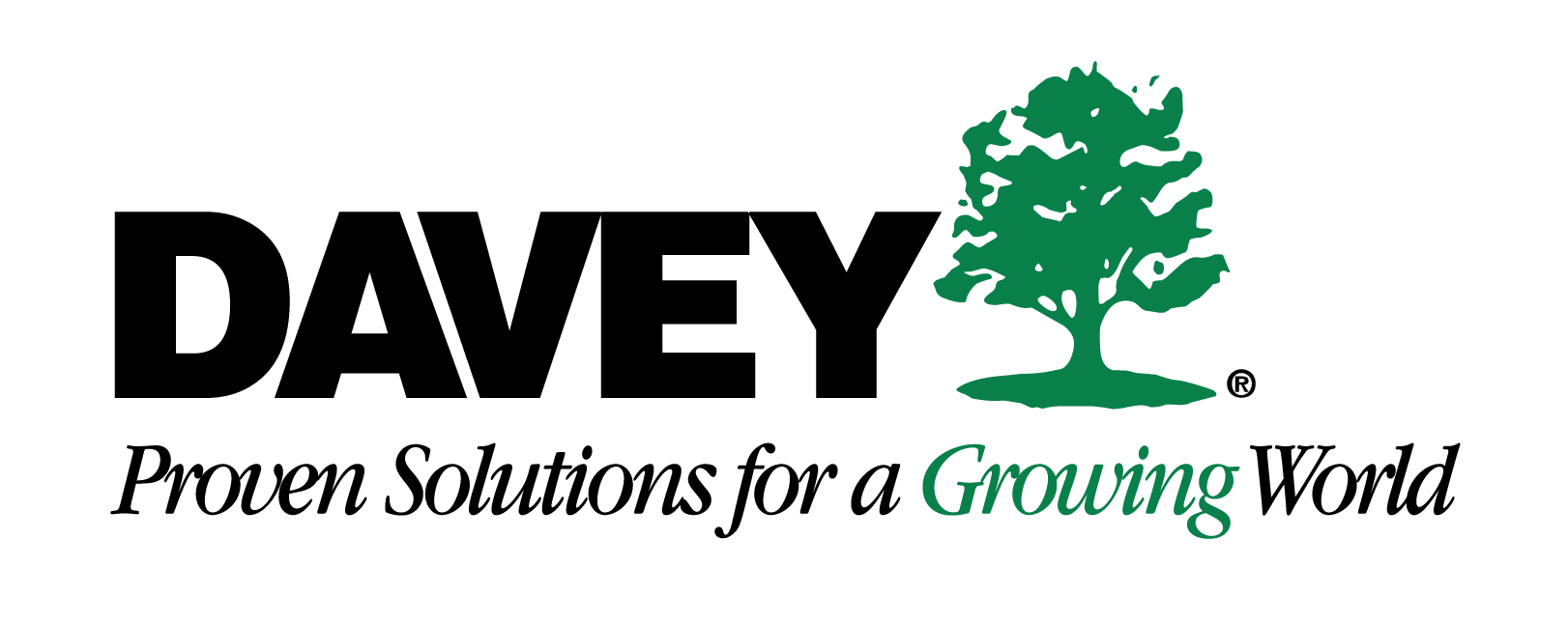Contract Automation Software: Concord
Automate negotiations, accelerate approvals, and manage every contract securely—all from one seamless platform.
- Negotiate in real-time, no more email chains
- Automate approval workflows, eliminate bottlenecks
- Centralize every contract, instantly searchable and secure
“Concord is my one-stop shop for the entire contract lifecycle. It’s Google docs, Microsoft Word, DocuSign and a File explorer, all in one.”

Hannah L., ⭐⭐⭐⭐⭐
Book a demo
What is Contract Automation Software?
Contract automation software is a digital solution that streamlines the creation, execution, and management of contracts throughout their lifecycle by replacing manual processes with automated workflows.
Concord’s contract software uses artificial intelligence and workflow automation to:
- Generate contracts from templates in minutes
- Route documents through approval workflows automatically
- Extract and analyze contract data with AI
- Send alerts for renewals and deadlines
- Integrate with CRM, ERP, and other business systems
Organizations using Concord typically see an 82% reduction in time spent on contract tasks and 25-30% reduction in administrative costs.
Table of Contents
Real-world impact: Case studies in contract automation software
Case Study: Centralizing Contract Workflows Improves Collaboration at Follett Learning

Key Benefits:
- • Subsidiary functionality
- • Centralized oversight
- • Flexible workflows
Follett Learning's decentralized manual contract processes created visibility issues and inefficiencies. Teams struggled to locate agreements and track key terms across departments.
Challenges:
- • Scattered contracts across departments
- • Time-consuming search processes
- • Inconsistent access controls
"The best part about Concord is it's so flexible. So we didn't have to go through a huge change in process. The subsidiary functionality is super important for us." — Sarah Eisenhauer, Director of Bids, Proposals, and Pricing
Contract Automation Software Comparison
When evaluating contract automation solutions, it's important to understand key differentiators. The table below compares Concord's capabilities with industry alternatives:
| Feature | Concord | Traditional CLM | Basic Document Management |
|---|---|---|---|
| AI-Powered Contract Analysis | ✓ Full capability | ◐ Limited | ✗ Not available |
| Centralized Repository | ✓ Unlimited storage | ✓ Often limited | ✓ Basic storage |
| Workflow Automation | ✓ Unlimited custom workflows | ◐ Limited workflows | ✗ Not available |
| E-Signature Integration | ✓ Seamless integration | ✓ Available | ✗ Not available |
| Real-Time Collaboration | ✓ Advanced capabilities | ◐ Basic collaboration | ✗ Not available |
| CRM/ERP Integration | ✓ Native + 5,000+ via Zapier | ◐ Limited integrations | ✗ Not available |
| Implementation Timeline | 4-6 weeks | 3-6 months | 1-2 weeks |
| Mobile Accessibility | ✓ Full functionality | ◐ Limited functionality | ✓ Basic access |

The high cost of manual contract processes
The financial impact of inefficient contract management is substantial and often underestimated:
- Businesses with 1,000+ employees spend between $2.5-$3.5 million annually searching for or recreating lost documents (Procurement Tactics, 2025)
- Poor contract management can cost companies up to 9.2% of their annual revenue through ineffective processes and missed opportunities (Precisely, 2023)
- The cost of manually creating and managing a single contract ranges from $6,900 for basic agreements to $49,000+ for complex contracts
- Without effective automation, up to 40% of an employee's time is spent on low-value contract tasks, resulting in approximately $2.7 million in lost productivity annually
These statistics highlight why organizations across industries are prioritizing contract automation as a strategic initiative. By implementing intelligent software solutions, businesses can significantly reduce these costs while improving operational efficiency.

Key capabilities of modern contract automation software
Today's contract automation platforms offer comprehensive functionality that addresses the entire contract lifecycle:
1. AI-powered contract creation and analysis
Modern contract automation leverages artificial intelligence to streamline document creation and analysis. According to Gartner, AI is expected to cut manual labor in the contract review process by half in 2026. This technology enables:
- Automated template selection based on contract type
- Dynamic clause insertion tailored to specific requirements
- Risk identification and flagging of problematic language
- Extraction of key terms from existing contracts for analysis
The impact of this capability is substantial—AI can complete contract reviews in 26 seconds compared to 92 minutes for human reviewers, while outperforming trained lawyers by 10% in accuracy.
2. Streamlined workflow automation
Contract automation software implements defined approval workflows that route documents to appropriate stakeholders in sequence, ensuring proper review while eliminating manual handoffs. These workflows:
- Reduce bottlenecks in the approval process
- Provide real-time visibility into contract status
- Automatically escalate delayed approvals
- Create audit trails for compliance purposes
Jenny McMullen, Corporate Contract Administrator at Yates Construction, notes: "All messages and comments live right inside the agreement. Instead of five separate email chains, we've got everything in one place now." This centralized approach saved her organization $15,000 monthly in reduced administrative overhead—a 25% reduction in contract administration costs.
3. Centralized contract repository
A secure, searchable repository serves as a single source of truth for all contracts and related documents. This centralization:
- Eliminates the need to search through email, shared drives, or physical storage
- Enables powerful search capabilities across all contract content
- Provides role-based access control for appropriate visibility
- Creates a complete audit history of all contract actions
According to Wolters Kluwer (2024), 65% of Chief Procurement Officers believe that contract management software improves risk management by enabling organizations to identify potential issues before they escalate.
4. Automated alerts and notifications
Contract automation platforms provide proactive notifications for critical dates and deadlines, ensuring teams never miss important milestones such as:
- Renewal deadlines
- Expiration dates
- Payment obligations
- Compliance requirements
- Performance reviews
This capability is particularly valuable for managing large contract portfolios. The International Association for Contract and Commercial Management reports that effective contract management can lead to a 9.2% improvement in annual revenue, with automated alerts playing a key role in this value creation.
5. Integration capabilities
Modern contract automation solutions integrate with existing business systems to create a unified ecosystem where data flows seamlessly between applications. Common integrations include:
- Customer Relationship Management (CRM) systems
- Enterprise Resource Planning (ERP) platforms
- Electronic signature solutions
- Procurement systems
- Financial management tools
These integrations eliminate duplicate data entry, ensure consistency across systems, and provide a more comprehensive view of business relationships.
Measuring the ROI of contract automation
Understanding the return on investment (ROI) from contract automation software is essential for securing buy-in and justifying the expense. Here's a framework for calculating potential ROI:
| ROI Category | Calculation Method | Average Impact |
|---|---|---|
| Time Savings | (Hours saved per contract × Average hourly rate × Number of contracts per year) | 82% reduction in time spent (Procurement Tactics, 2025) |
| Process Efficiency | (Average cycle time reduction × Cost per day of delay × Number of contracts) | 80% faster cycle time |
| Risk Reduction | (Potential cost of non-compliance × Risk reduction percentage) | 55% compliance improvement |
| Administrative Cost Reduction | (Current administrative costs × Expected reduction percentage) | 25-30% cost reduction |
| Revenue Capture | (Value of improved renewal rates × Contract renewal percentage improvement) | 56% renewal rate (vs. 25% industry average) |
According to PwC, enterprises could save 2% of their total annual costs by implementing automated contract management systems to improve contract accuracy and compliance. Goldman Sachs concludes that automation can speed up negotiations by 50% and reduce payment errors by 75-90%.

Implementation strategies for success
Successfully implementing contract automation software requires thoughtful planning and execution. Based on industry best practices and customer experiences, here are key recommendations:
Phase 1: Assessment and preparation (1-3 months)
- Conduct a contract inventory to identify all existing contracts, their locations, and current management processes
- Define clear objectives aligned with organizational goals, such as reducing cycle time or improving compliance
- Identify key stakeholders and form a cross-functional implementation team with representatives from legal, procurement, IT, and relevant business units
- Establish success metrics (KPIs) for measuring ROI and impact
Phase 2: Implementation and configuration (3-6 months)
- Select the right solution based on your specific requirements, budget, and integration needs
- Configure workflows to match your approval processes and business rules
- Migrate existing contracts into the new system, using AI to extract key terms and metadata
- Integrate with key systems to create a connected ecosystem
- Develop standardized templates and clause libraries for consistency
Phase 3: Adoption and optimization (6+ months)
- Provide comprehensive training tailored to different user groups
- Create champions within each department to drive adoption
- Monitor usage and performance against established metrics
- Gather user feedback for continuous improvement
- Expand capabilities by implementing advanced features and additional integrations
Following these phases helps organizations avoid common pitfalls and maximize value from their contract automation investment.

Industry-specific applications
While contract automation delivers benefits across all sectors, its application varies based on industry-specific needs:
Higher education
Colleges and universities manage thousands of contracts with complex compliance requirements. A National Association of Educational Procurement study found that the average higher education institution spends $70 million on outside vendors and maintains relationships with 1,230 different vendors.
Contract automation software helps these institutions:
- Centralize contract management across decentralized departments
- Standardize agreements for consistent terms and conditions
- Ensure regulatory compliance with laws like FERPA
- Track vendor relationships to prevent duplicate contracts
- Protect intellectual property and sensitive information
Contract automation can accelerate negotiation cycles by 50%, reduce erroneous payments by 75-90%, and cut operating and processing costs by 10-30% in educational institutions.
Healthcare
Healthcare organizations must manage complex regulatory requirements while controlling costs. Healthcare contract automation provides:
- Enhanced HIPAA compliance through standardized agreements
- Improved vendor relationship management for medical supplies
- Streamlined credentialing processes for practitioners and facilities
- Risk mitigation for patient care agreements and insurance contracts
- Consolidated visibility across multiple facilities
One healthcare organization, Kettering Health, implemented contract automation to transform their contract management processes, resulting in significant time savings and improved compliance (Aavenir, 2021).
Financial services
The financial sector deals with high-volume, high-risk contracts that require stringent compliance. Contract automation helps by:
- Ensuring adherence to regulations like GDPR, KYC, and AML
- Standardizing complex financial agreements
- Providing audit trails for regulatory reporting
- Managing counterparty risk through automated assessments
- Accelerating deal closures for time-sensitive transactions
JP Morgan implemented blockchain-based smart contracts for cross-border payments, significantly reducing processing times and improving efficiency (Legittai, 2024).
Emerging trends in contract automation
The contract automation landscape continues to evolve, with several key trends shaping its future:

1. Generative AI advancements
Generative AI is transforming contract automation, with capabilities extending beyond simple data extraction to include:
- Drafting complete contracts based on minimal inputs
- Analyzing historical negotiations to suggest optimal terms
- Generating customized playbooks for different contract types
- Predicting potential risks and suggesting mitigations
Generative AI is a game changer for contract professionals, though implementing it effectively requires careful consideration of when and how to apply it.
2. Blockchain and smart contracts
Blockchain technology is enhancing contract automation through:
- Tamper-proof audit trails for greater accountability
- Self-executing smart contracts that automatically enforce terms
- Enhanced security for sensitive contract information
- Streamlined multi-party agreements with greater transparency
Organizations like Dubai's Land Department have implemented blockchain-based systems for property transactions, resulting in increased efficiency and reduced fraud (Legittai, 2024).
3. Mobile-first solutions
As work patterns shift toward hybrid models, contract automation is adapting with mobile-friendly interfaces. A full 71% of legal teams now operate in a hybrid model, increasing demand for accessible contract solutions that work across devices.
These mobile capabilities ensure that business continues uninterrupted regardless of location, enabling:
- On-the-go contract approvals
- Real-time collaboration from any device
- Instant access to contract information in meetings
- Electronic signatures from mobile devices
4. Predictive analytics
Advanced analytics capabilities are enabling organizations to:
- Forecast renewal outcomes based on historical data
- Identify patterns in contract performance
- Optimize pricing based on contract analysis
- Predict potential compliance issues before they occur
- Recommend strategic contract improvements
These capabilities transform contract management from a reactive to a proactive function, helping organizations identify opportunities and mitigate risks before they materialize.
May 2025 Contract Automation Trends
As of May 2025, several emerging developments are reshaping the contract automation landscape:
1. Hyper-automation Integration
The convergence of AI, RPA, and machine learning technologies is creating end-to-end automated contract ecosystems that require minimal human intervention. Organizations are implementing hyper-automation to connect contract processes with broader business operations.
2. ESG Compliance Capabilities
With increasing regulatory focus on Environmental, Social, and Governance (ESG) factors, contract automation platforms now feature specialized tools to track sustainability commitments, diversity requirements, and ethical business practices within agreements.
3. Vertical-Specific Solutions
The market is seeing a shift toward industry-tailored contract automation platforms with pre-configured templates, clauses, and workflows designed for specific sectors like healthcare, construction, and SaaS.
4. Quantum-Resistant Security
As quantum computing advances, leading contract automation providers are implementing quantum-resistant encryption to ensure long-term document security against future decryption threats.
Implementation challenges and solutions
While the benefits of contract automation are clear, organizations often face challenges during implementation. Understanding these potential roadblocks and their solutions can help ensure success:

Challenge 1: Stakeholder resistance
Many stakeholders, particularly legal teams, may resist changing established processes or worry about automation replacing their expertise.
Solution: Focus on how automation enhances rather than replaces human judgment. Involve key stakeholders early in the selection process and demonstrate how the system will address their specific pain points. Create champions within each department who can advocate for the solution.
Challenge 2: Data migration complexity
Migrating existing contracts and extracting relevant data can be daunting, especially for organizations with thousands of legacy agreements.
Solution: Develop a phased migration approach, prioritizing active contracts and those nearing renewal. Leverage AI-powered data extraction to automate the process, and establish clear data standards for consistency. Consider working with implementation partners who specialize in contract migration.
Challenge 3: Integration with existing systems
Ensuring seamless data flow between contract automation software and other business systems can be technically challenging.
Solution: Prioritize solutions with robust API capabilities and pre-built integrations with your existing tech stack. Develop a clear integration strategy, focusing first on critical systems like CRM and ERP. Consider conducting pilot integrations before full deployment.
Challenge 4: Budget constraints
Securing funding for new technology investments can be difficult, particularly without a clear ROI case.
Solution: Build a compelling business case highlighting both hard cost savings and soft benefits. Start with a smaller implementation scope to demonstrate value quickly, then expand. Consider solutions with flexible pricing models that allow you to scale as needed.
How to Choose the Right Contract Automation Software in 2025
Selecting the optimal contract automation solution requires careful evaluation across several key dimensions:
Essential Evaluation Criteria
1. User Experience
The most sophisticated capabilities are worthless if users find the system difficult to navigate. Prioritize solutions with intuitive interfaces that require minimal training and encourage adoption across departments.
2. Scalability
As your organization grows, your contract automation platform should grow with you. Assess whether the solution can handle increasing contract volumes, additional users, and expanded functionality without performance degradation.
3. Implementation Approach
Implementation timeframes vary significantly between providers. Evaluate whether the vendor offers a phased approach that delivers quick wins while building toward comprehensive automation.
4. Integration Capabilities
Contract data should flow seamlessly between your business systems. Determine whether the solution offers pre-built connectors for your critical applications or robust APIs for custom integrations.
5. Security and Compliance
Contract repositories contain sensitive information requiring robust protection. Verify the solution's security certifications, data encryption standards, and compliance features relevant to your industry.
Questions to Ask Potential Providers
- How does your AI technology handle non-standard contract formats and languages?
- What is your typical implementation timeline, and what resources will we need to commit?
- How do you measure and demonstrate ROI for customers similar to our organization?
- What differentiates your solution from competitors in our specific industry?
- How often do you release updates, and what is your product roadmap for the next 12 months?
Contract Automation Software Evaluation Checklist
Use this comprehensive checklist to evaluate potential contract automation solutions:
Core Functionality
- □ Automated document generation from templates
- □ Configurable approval workflows
- □ Centralized contract repository with advanced search
- □ Automated alerts for critical dates and milestones
- □ Electronic signature capabilities
- □ Clause library with version control
- □ Obligation management and tracking
- □ Reporting and analytics capabilities
Advanced Capabilities
- □ AI-powered contract analysis and risk assessment
- □ Third-party paper ingestion and analysis
- □ Collaborative negotiation tools
- □ Mobile accessibility and approvals
- □ Integration with key business systems (CRM, ERP, etc.)
- □ Customizable dashboards and reporting
- □ Global language support
- □ Blockchain/distributed ledger capabilities
Implementation and Support
- □ Phased implementation approach
- □ Dedicated customer success manager
- □ Comprehensive training program
- □ Ongoing support options
- □ Regular product updates
- □ Active user community
- □ Migration services for existing contracts
Contract automation software FAQs
How does AI enhance contract automation software capabilities?
AI-powered contract automation software uses natural language processing to complete contract reviews in 26 seconds versus 92 minutes for human reviewers, while achieving 10% higher accuracy than trained lawyers. AI enables automated template selection, dynamic clause insertion, risk identification, and key term extraction from existing contracts.
What cost savings can organizations expect from contract automation software?
Contract automation software typically delivers 25-30% reduction in administrative costs, 82% reduction in time spent on contract tasks, and prevents organizations from spending $2.5-$3.5 million annually searching for lost documents. Poor contract management costs up to 9.2% of annual revenue, making automation a critical investment.
Which approval workflow features should contract automation software include?
Effective contract automation software provides unlimited approval workflows that route documents to appropriate stakeholders in sequence, real-time visibility into contract status, automatic escalation of delayed approvals, and complete audit trails for compliance. These features eliminate manual handoffs and reduce bottlenecks.
How does contract automation software integrate with existing business systems?
Contract automation software integrates with CRM systems for auto-filling contract data, ERP platforms for financial synchronization, electronic signature solutions like DocuSign, procurement systems, and financial management tools. These integrations eliminate duplicate data entry and create a unified business ecosystem.
What security standards should contract automation software meet?
Enterprise-grade contract automation software should include SOC 2 Type II certification, GDPR compliance, role-based access control, complete audit trails tracking every contract interaction, and zero data retention policies for AI training. These features ensure contract data remains secure and compliant.
Can contract automation software handle industry-specific compliance requirements?
Yes, contract automation software adapts to industry-specific needs including HIPAA compliance for healthcare, FERPA compliance for higher education, and regulatory requirements for financial services. The software standardizes agreements, ensures regulatory adherence, and provides audit trails for regulatory reporting.
What implementation timeline should organizations expect for contract automation software?
Contract automation software implementation follows a phased approach: Phase 1 (1-3 months) for assessment and preparation, Phase 2 (3-6 months) for configuration and migration, and Phase 3 (6+ months) for adoption and optimization. This timeline ensures successful deployment and maximum ROI.
How does contract automation software improve renewal management processes?
Contract automation software provides automated alerts for renewal deadlines, prevents missed auto-renewals that lock organizations into unfavorable terms, creates renewal workflows with assigned tasks, and tracks vendor performance data. This proactive approach enables strategic renegotiation and prevents service disruptions from expired contracts.
THE PROBLEM CONCORD SOLVES

Managing contracts is difficult because they can be scattered across different places: emails, cloud drives, personal drives, and even paper copies.
Many companies rely on spreadsheets to store contract details like lifecycle dates and total contract value, but these spreadsheets don’t provide a full view of the contract, and it’s tedious to keep updated.
When contracts are saved on personal drives, critical information—like renewal dates and deadlines—is hidden from the rest of the team. This can cause headaches for audits.
If a renewal date is missed, contracts may auto-renew without the chance to renegotiate terms, potentially locking the company into bad deals.
Worse, important contracts could expire without notice, leading to service disruptions, penalties, or lost business opportunities.
CONCORD'S SOLUTION
With Concord's agreement intelligence, each step after the signature becomes an opportunity to gain insight, act strategically, and ensure compliance.
Instead of spending time and resources tracking down individual agreements or manually searching for specific terms, companies have instant access to the critical information they need.
This not only reduces missed renewals and enables smarter vendor contract management but also allows the business to make data-driven decisions that were previously out of reach.
Ultimately, agreement intelligence is more than a simple upgrade to contract storage. It represents a shift in how contracts support the business, transforming them from static documents into powerful tools that can guide strategy and fuel growth.
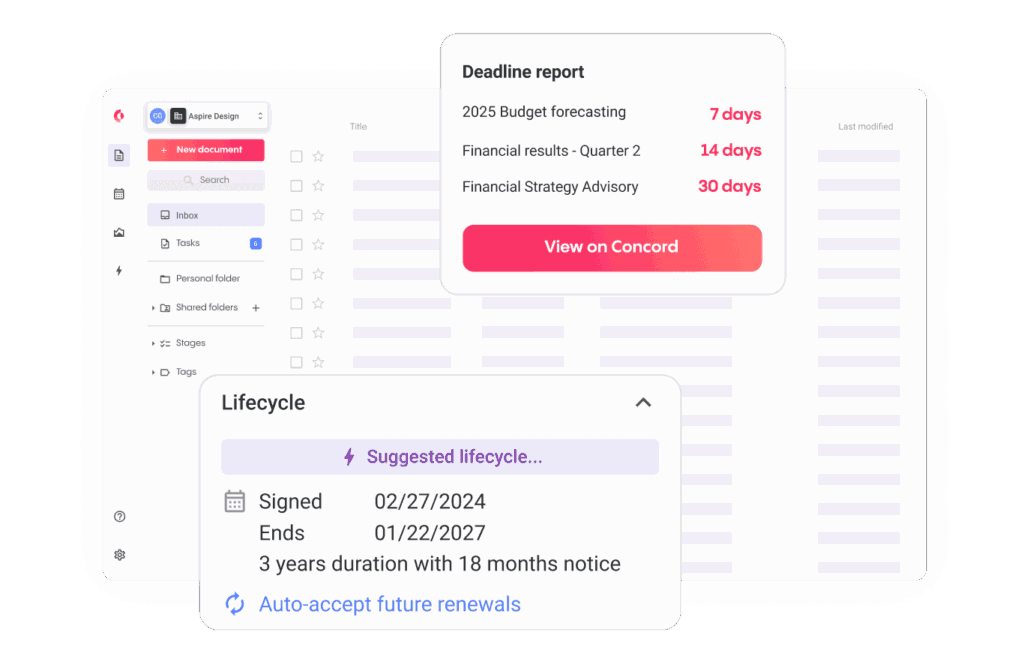
Automated processes
contracts are managed via automated workflows, all in one intuitive platform
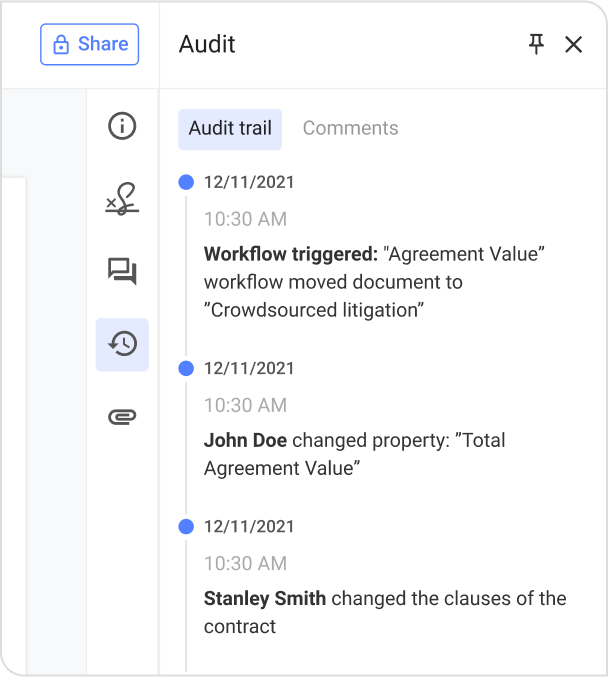
Manual processes
contracts have to be managed manually, across many platforms

Full visibility into contracts
the finance team can quickly search all contracts and get email updates
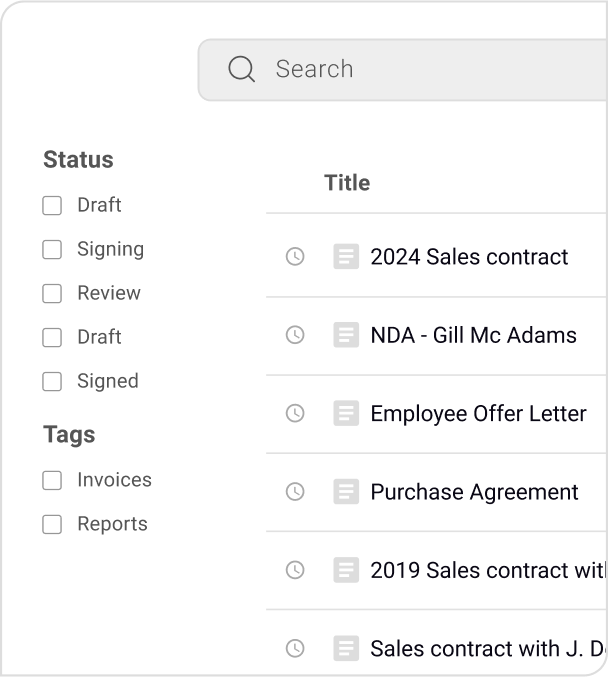
Limited visibility into contracts
the finance team lacks insight into contract amounts and other key terms

AI-powered data extraction
Agreement Intelligence extracts all contract terms automatically
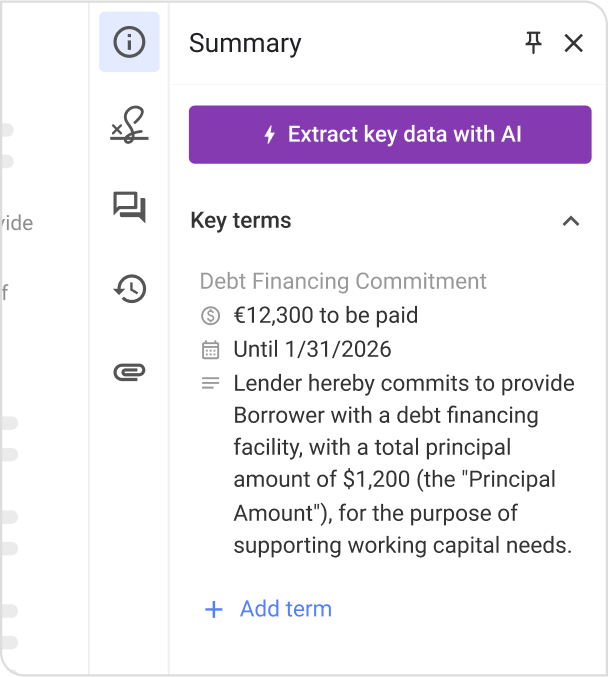
Time-consuming data collection
forecast data has to be entered by hand, requiring hours of labor
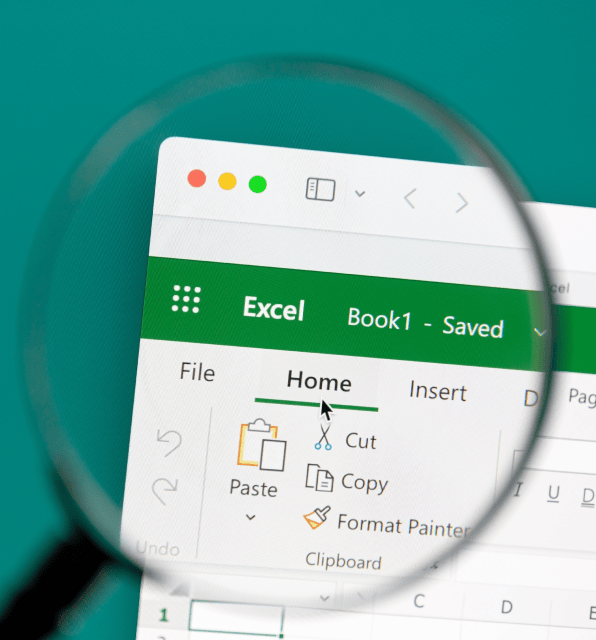
Get deep visibility into all the agreements you sign
Concord extracts deadlines, dollar amounts, and other key terms from MS Word docs, Google Docs, and PDFs — plus contracts signed in PandaDoc, DocuSign, Icertis, and more.


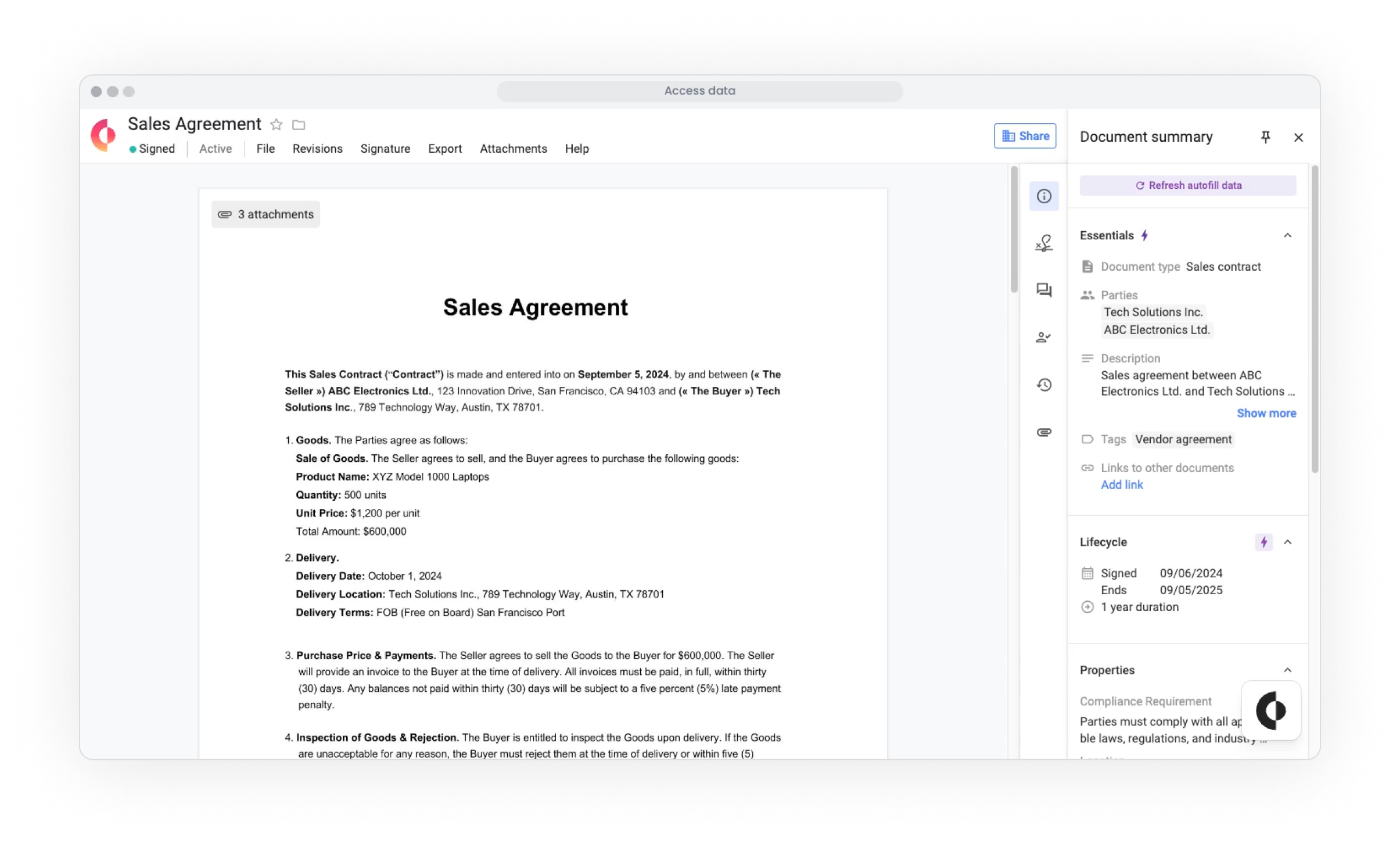
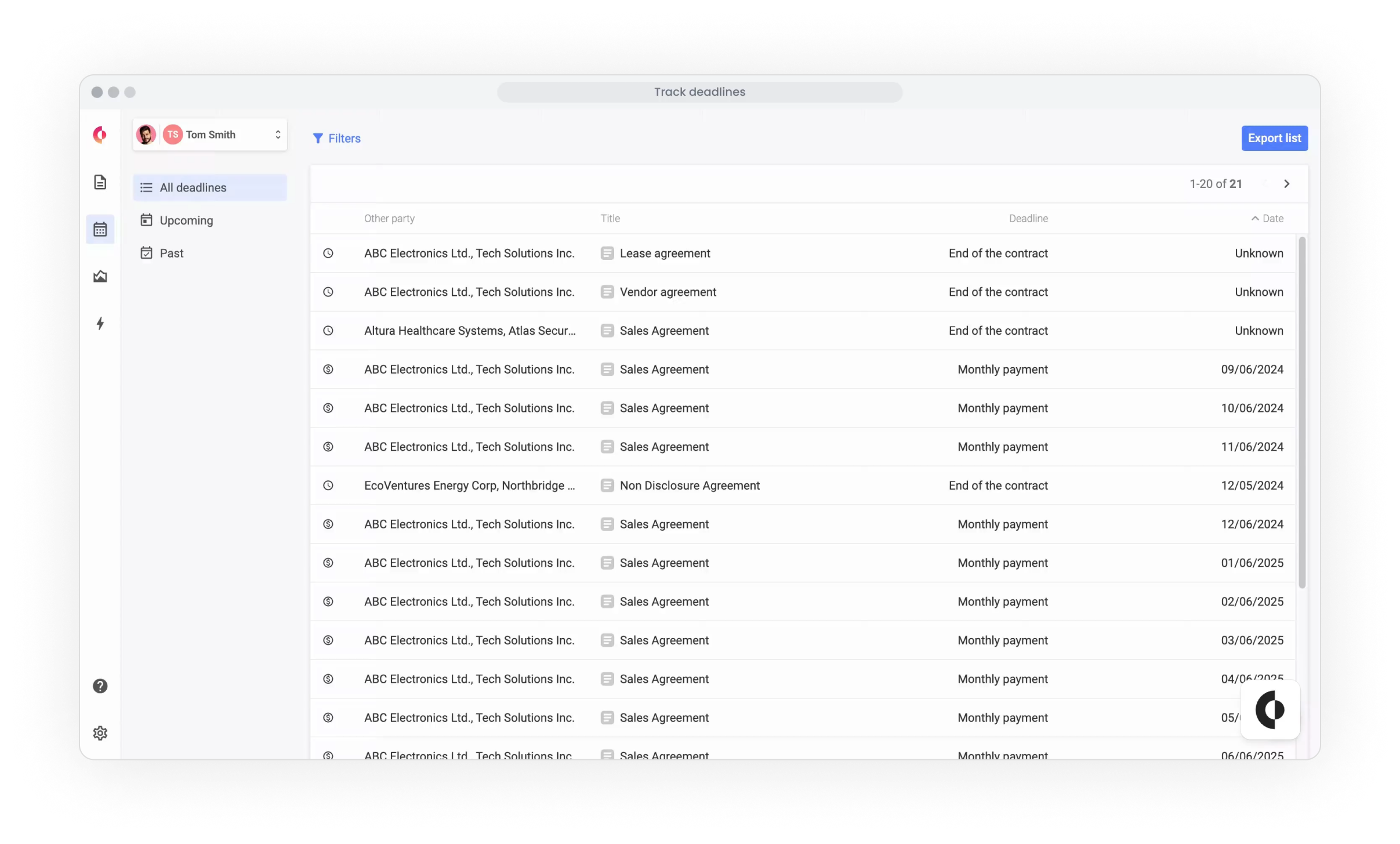


One place for all your contracts
Unlimited storage
Store every contract, securely, without worrying about limits
Custom permissions
Control who accesses each document with custom permission settings
Smart Search
Find any contract instantly with powerful search and filtering tools
Real-Time Collaboration
Work together seamlessly with team members, regardless of location or department
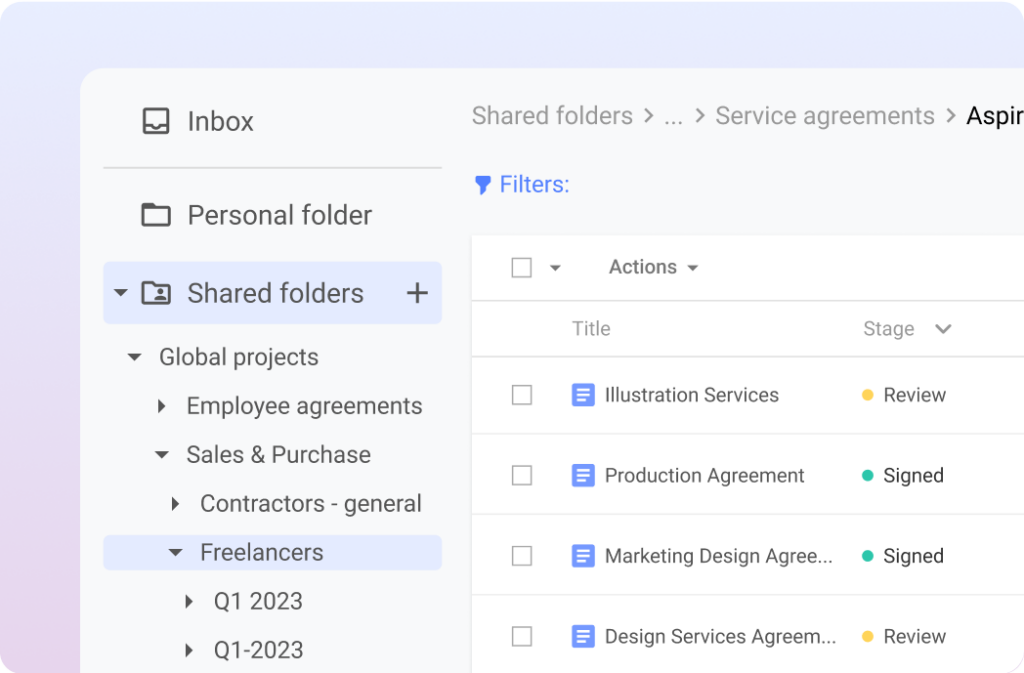


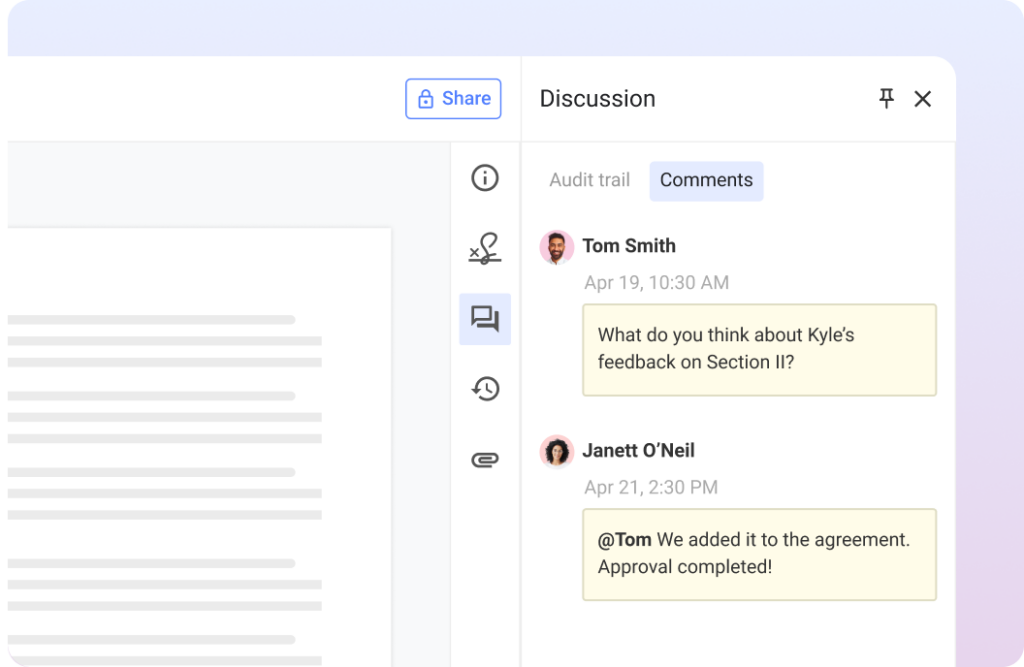
Automate the contract lifecycle with contract automation software
Unlimited Approval Workflows
Set up unlimited approval workflows for every type of contract
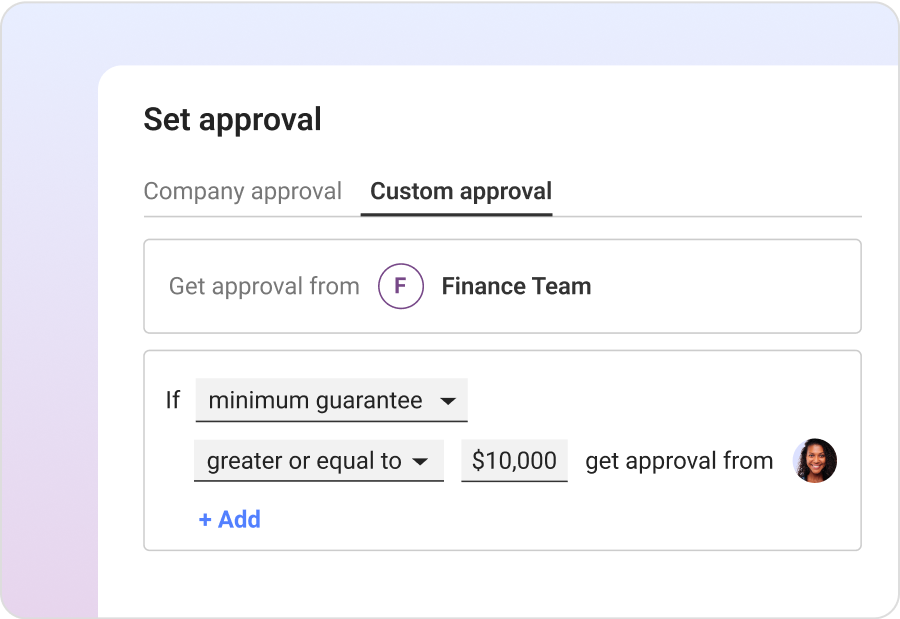
Deadline Reminder Notifications
Never miss another renewal date or approval with smart alerts

The highest level of security for your contracts
Enterprise-grade security
Concord implements enterprise-grade measures, including SOC 2 Type II certification, GDPR compliance, and a Star Level One rating from the Cloud Security Alliance.
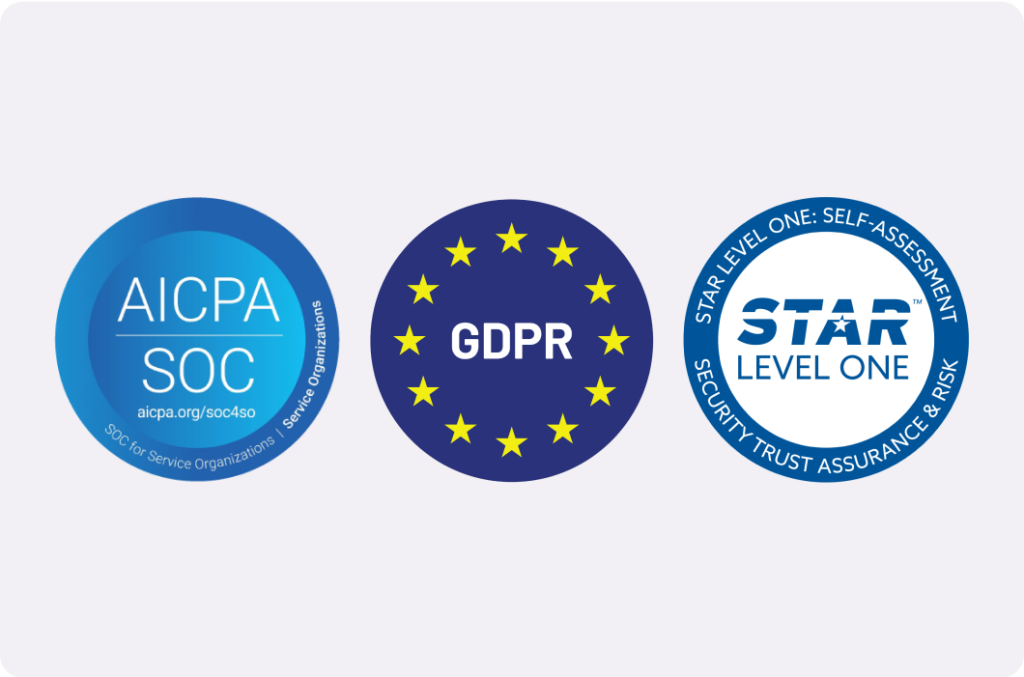
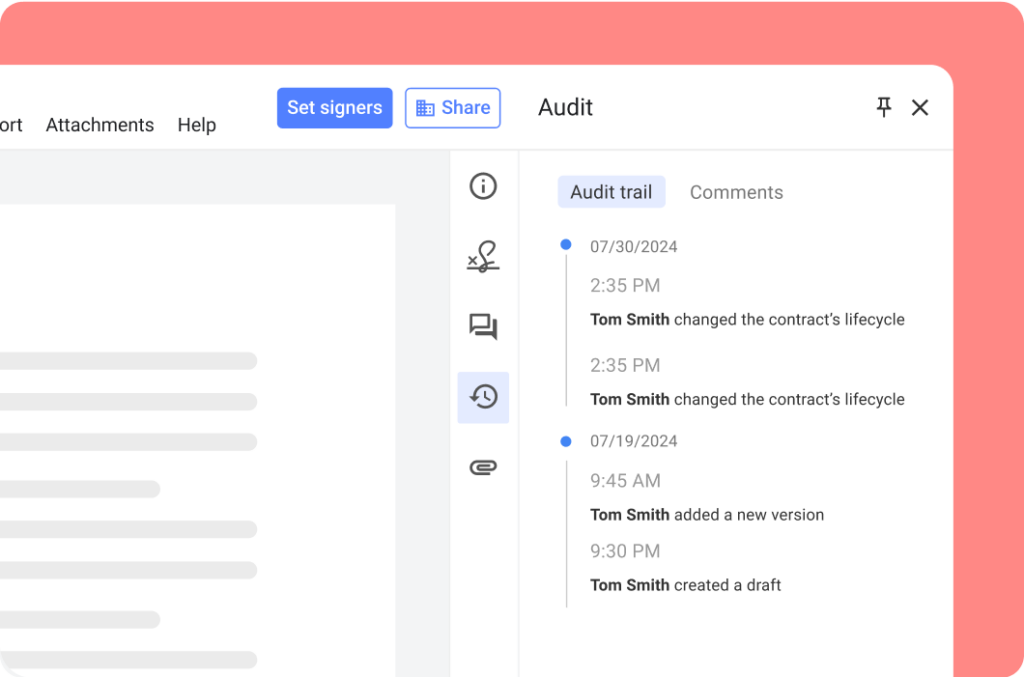
Audit trail
Track every interaction with contracts for complete
transparency and accountability
Contract management software that easily connects to your existing stack
CRM integration
Create contracts that auto-fill with data from your CRM deals – then share, negotiate, and sign them in
Concord
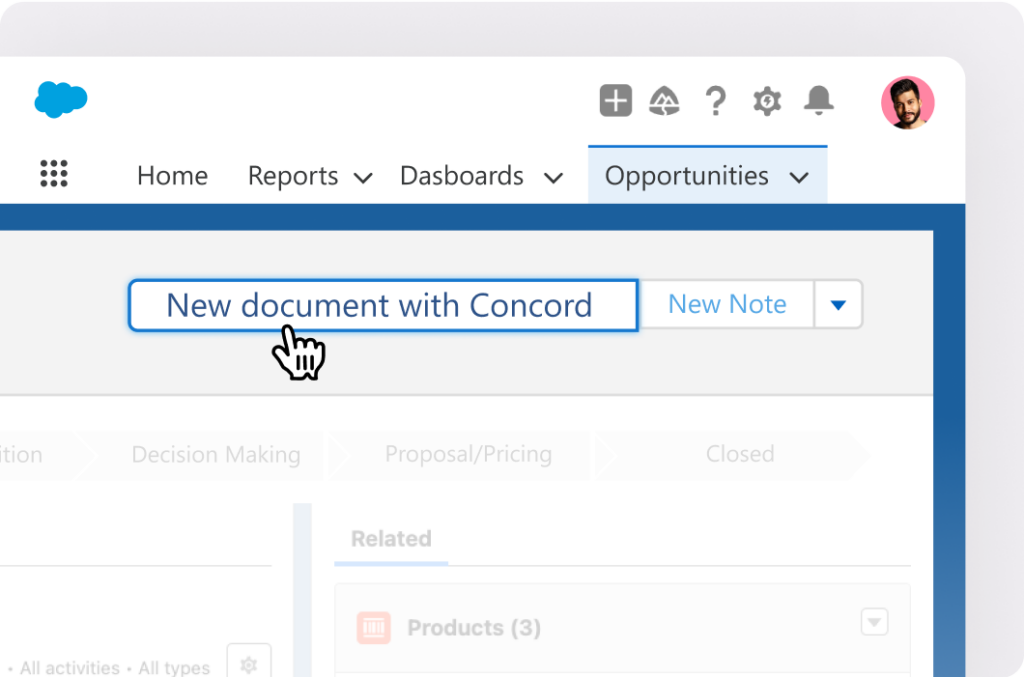
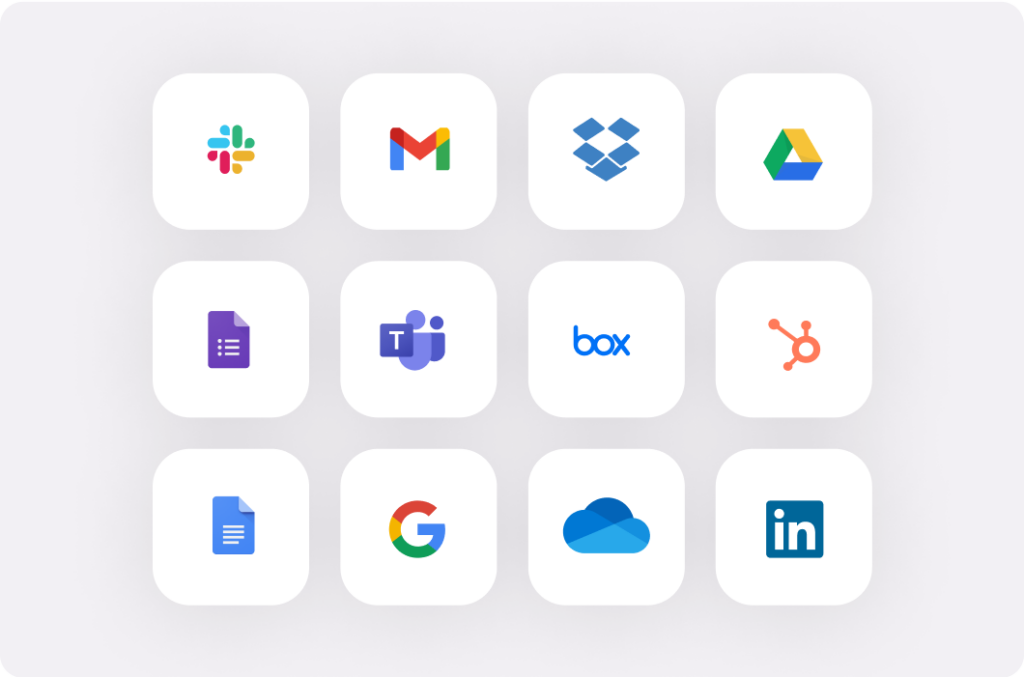
Zapier
Connect with over 5,000 apps to automate workflows across platforms
Thousands of labor hours saved for teams around the globe
“Concord knows exactly what data I want, before I even ask for it. It thinks for me.”

Ramola Khushlani
Contract Manager at Workspend
“The velocity of our organization has improved dramatically since we’ve adopted Concord.”

Peter Koutromanos
CEO at Avior Capital
-20%
Less time spent searching for contract terms every day








